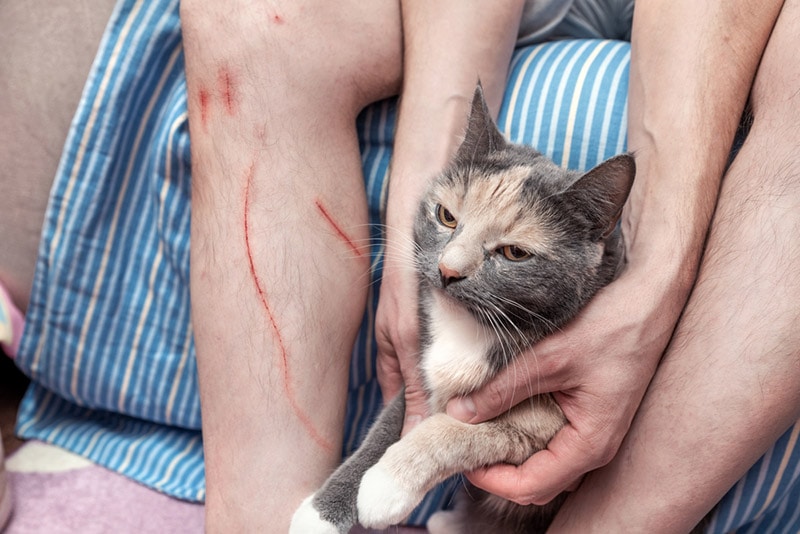
The information is current and up-to-date in accordance with the latest veterinarian research.
Learn more »
If you own a cat, or several of them, the chance you’ve been scratched is relatively high. While not overtly aggressive, most cats scratch if they feel fearful or anxious or are handled improperly. Often the scratches they leave behind are surface wounds that can be easily treated at home. However, some cat scratches are deeper and can bleed if deep enough, often profusely. Cat scratches can also swell and become infected, particularly if their claws have dug in deep.
If you’ve been scratched by a cat, whether yours, a feral cat, or a cat owned by someone you know, treating the scratch correctly and quickly can save you a lot of pain and misery. To help, we’ll discuss eight important tips on how to treat a cat scratch correctly.
The 8 Important Tips for Treating Cat Scratches
1. Treat the Scratch Immediately
One mistake many people make after being scratched by a cat is to put off treating the wound. If the scratch bleeds, immediate treatment is necessary.
That typically involves the following steps:
Clean the scratch vigorously with soap and warm water for at least 5 minutes
Apply a clean, dry gauze pad to the scratch until it stops bleeding
Apply an OTC antibiotic cream to the scratch
Cover the scratch entirely with a fresh gauze pad or bandage
Check the scratch daily to ensure it’s not infected
Change the bandage daily until the scratch is healed enough to be left uncovered
2. Know the Signs of an Infected Cat Scratch
After being scratched by a cat, one of two things will usually happen. The 1st is that the injury will heal, and everything will return to normal. The 2nd, however, is more serious. That’s when, for whatever reason, the cat scratch gets infected. To determine if a cat scratch is indeed infected, it pays to know the signs, which include the following:
Increased redness around the scratch
The wound is unusually warm to the touch
The scratched area starts to swell and is tender or painful
Pus begins to drain from the scratch site
One or more lymph nodes on your body are swollen
You have chills, fever, or muscle aches
You feel fatigued
Image Credit: osobystist, Shutterstock
3. If Necessary, Call Your Local Animal Control Center
If your cat scratches you and you know its history and whereabouts, there’s no need to use this tip. However, calling your local animal control center is a must if a cat has scratched you that you don’t know or recognize, including a feral cat. The reason why is that the cat might be infected with several diseases, including rabies, and may need to be captured and quarantined. By calling animal control, the chance of catching the cat and determining if it’s sick will be much easier and faster. It might also save you from going through painful treatments for rabies.
4. Make Sure Your Tetanus Shots Are Up to Date
Although they seem unrelated, veterinarians and medical doctors strongly advise anyone scratched deeply by a cat to ensure their tetanus vaccination is up-to-date. The reason is that both rabies and tetanus are caused by neurotoxins that cause infections, which adversely affect the central nervous system (CNS) and can cause paralysis.
Both infections, once symptoms appear, are nearly 100% fatal. Luckily, tetanus is wholly preventable with the tetanus vaccine. The only drawback is that the vaccine needs to be re-administered about once every 10 years, especially if you live in an area of the world known for having high numbers of tetanus cases. Most importantly, a cat can spread tetanus via its nails when it scratches, which is why updating your tetanus vaccination is a very good idea.
5. Never Let a Cat Lick the Scratch It Caused
One of the worst things you can do after being scratched by a cat is to let the cat lick your scratch, especially if it’s an open wound that’s been bleeding. Up to 40% of cats carry the Bartonella henselae bacteria. This is the bacteria that causes cat scratch fever, an infection that can spread and cause illness in humans.
6. Know the Signs of Cat Scratch Fever
An infected cat scratch, as we saw earlier, can cause several signs that you need to know in order to treat it correctly. The same can be said for the signs of cat scratch fever, some of which are similar, but some are unique to this illness.
Those signs include the following:
A scratch that keeps getting redder and warmer
Flu-like symptoms, including body aches and fever
A rash near the site of the scratch
Extreme weakness, fatigue, or lethargy
Swollen lymph nodes near the site of the scratch
7. Know How to Reduce Your Infection Risk from Cat Scratches
The best way to reduce the chance you get sick from a cat scratch is to prevent your cat from scratching you in the first place. That, however, isn’t always possible, as cats are impulsive creatures that often scratch for unknown reasons. To help you reduce the chance of a cat scratching you, and reduce the chance of infection if you do, use the tips below:
Avoid rough play and interactions with your cats
Wash deep scratches immediately with soap and water, and treat them correctly
Cover any open wounds so that your cat can’t lick them
Treat your cat for fleas regularly
Keep your cat indoors
Never try to pet or pick up a cat you don’t own
Don’t get near your cat with your face when playing with them
Make sure you and your cat are both up-to-date on your vaccines
Image Credit: Taya Ovod, Shutterstock
8. Seek Medical Attention for a Cat Scratch that Doesn’t Stop Bleeding
Unless it’s a deep wound that’s quite serious, the bleeding will usually stop on its own once your body has had adequate time to respond. If your cat has scratched you and the scratch keeps bleeding, a trip to the emergency room or your local medical doctor is highly recommended. A scratch that continues to bleed is highly unusual.
Final Thoughts
Most cat owners will deal with scratches at least once, if not several times. Scratches are one of the risks of cat ownership, but as we’ve seen, they can cause dire consequences in some cases. Knowing how to treat a cat scratch correctly and the signs that a scratch is infected are critical.
The information provided today will go far towards preventing any health issues or emergencies if a cat has scratched you, whether yours or a cat you don’t recognize. With care, due diligence, and proper precautions, a cat scratch won’t lead to any dire circumstances and will heal.
Featured Image Credit: Kobzev Dmitry, Shutterstock






